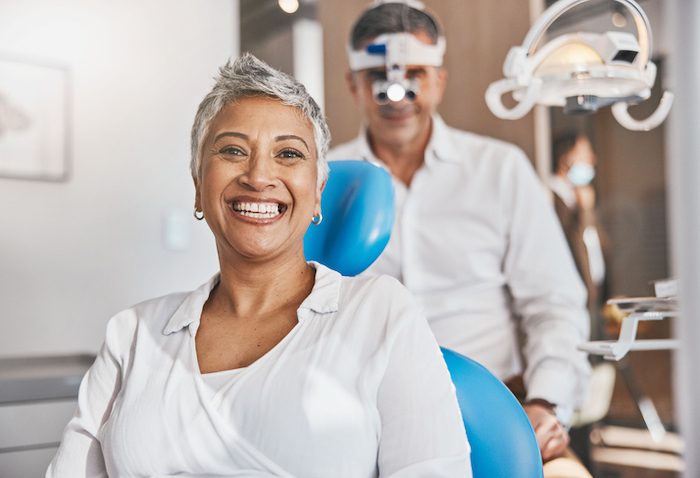At Mill Creek Dental, we strive to ensure that every patient is comfortable in our office. For some patients, it can be hard to even set foot in a dentist office due to anxiety. Sedation dentistry is a general dentistry treatment that allows patients with anxiety and other conditions to get the necessary care. It keeps patients relaxed throughout even intensive procedures, allowing the dentist to provide more efficient care.

Types of Dental Sedation in Canton, TX
Multiple sedation options are available. Before proceeding with sedation, we will consult with you, review your medical history, and ensure that sedation is safe. We’ll also discuss your issues with the dentist office and the treatments you need so that we can determine which level of sedation is the best choice.
Nitrous Oxide
Nitrous oxide, often known as laughing gas, is the mildest form of sedation we offer and the only one where you can drive yourself to and from your appointment. You inhale it through a cannula or mask throughout your procedure. It takes effect and dissipates quickly, so you only need a few breaths to get the effects or stop them.
Because it’s so mild, it’s safe for children to use. Breathing it in provides a relaxed, euphoric sensation. You’ll still know everything around you, but you won’t care. You’re able to answer questions if the dental staff has any.
Oral Conscious Sedation
Oral conscious sedation is deeper sedation given in a prescribed pill that you take about an hour before your appointment. Depending on your needs, it may be a sedative, anxiety medication, or a combination of the two. Because the effects last for hours, you’ll need a ride to and from your appointment.
Oral conscious sedation doesn’t put you to sleep, but you may relax enough to fall asleep during the procedure. It’s common to experience amnesia moments where you don’t remember parts of the procedure. Sometimes, this is used in conjunction with laughing gas.
IV Sedation
This is the deepest form of sedation we offer. Instead of taking medications in pill form, we administer them directly into the bloodstream. Your condition is monitored throughout the procedure, and we adjust the medication as needed. Typically, we reserve this for the most invasive procedures or instances where you need multiple procedures in one sitting.
Though this option doesn’t put you to sleep, you’ll probably fall asleep throughout the entire thing. It’s common to have complete amnesia and not remember anything from the procedure.
Who Benefits From Dental Sedation?
Usually, sedation dentistry is mentioned for patients who suffer from dental anxiety. Dental fear occurs on a spectrum. Some patients may only be triggered by a specific sound or tool, while others have trouble entering the office. This becomes a problem when you aren’t getting regular dental care. Preventative dentistry provides mild care to avoid more serious dental procedures. If you’re avoiding care, you’re more likely to need intensive dental work.
Sedation allows patients to get routine dental care without worrying. It also helps with intensive care or multiple procedures. When patients are relaxed, they can sit in a chair all day and allow the dentist to work uninhibited. Dentists can work faster when patients are sedated and relaxed.
Patients with movement disorders make involuntary movements that they can’t control. Children can also have a hard time sitting still on their own. Dental care requires sharp dental tools, which can endanger patients if they move at the wrong time. Sedation relaxes these movements so that you can get safe dental care.
Strong gag reflexes make dental care difficult. A gag reflex basically fights the dentist as they try to work while making things extremely uncomfortable for the patient. Sedation relaxes the gag reflex and allows comfortable, productive dental care.
Frequently Asked Questions
Can sedation help with a strong gag reflex?
Yes, sedation can help manage a strong gag reflex by relaxing you and reducing sensitivity in the throat. Nitrous oxide or oral sedatives can help make dental procedures more comfortable. Your dentist will recommend the best sedation level for your situation.
What type of sedation is used for dental implants?
For dental implants, sedation options include local anesthesia, oral sedation, IV sedation, or general anesthesia. The choice depends on the complexity of the procedure and your comfort level. IV sedation is common for longer implant surgeries because it provides relaxation and reduced awareness.
Could I be allergic to dental sedatives?
It’s possible to have an allergic reaction to certain dental sedatives, but it’s rare. We will review your medical history and any known allergies to minimize risks. Always inform our dental team about any medications or allergies before sedation.
Can I use sedation dentistry if I’m pregnant?
Sedation during pregnancy isn’t recommended, especially in the first trimester, as it may pose risks to the developing baby. Local anesthesia is typically safe and sufficient for most procedures. We usually postpone elective procedures requiring sedation until after delivery. Always consult your dentist and OB-GYN before undergoing dental treatment while pregnant.
Are there any side effects of dental sedation?
Yes, side effects of dental sedation can include drowsiness, nausea, dry mouth, or temporary memory loss, depending on the type of sedation used. Most side effects are mild and wear off within a few hours. We will discuss potential side effects with you before the procedure. You’ll need to rest for the remainder of the day.
Can I drive myself home after sedation dentistry?
No, you cannot drive yourself home after sedation dentistry if oral or IV sedation is used. These forms of sedation impair your coordination and judgment. You’ll need a responsible adult to take you home. However, if only nitrous oxide is used, you can typically drive yourself afterward, as its effects wear off quickly.
Schedule a Consultation
Do you think sedation dentistry can benefit you? Call us or schedule an appointment online.
